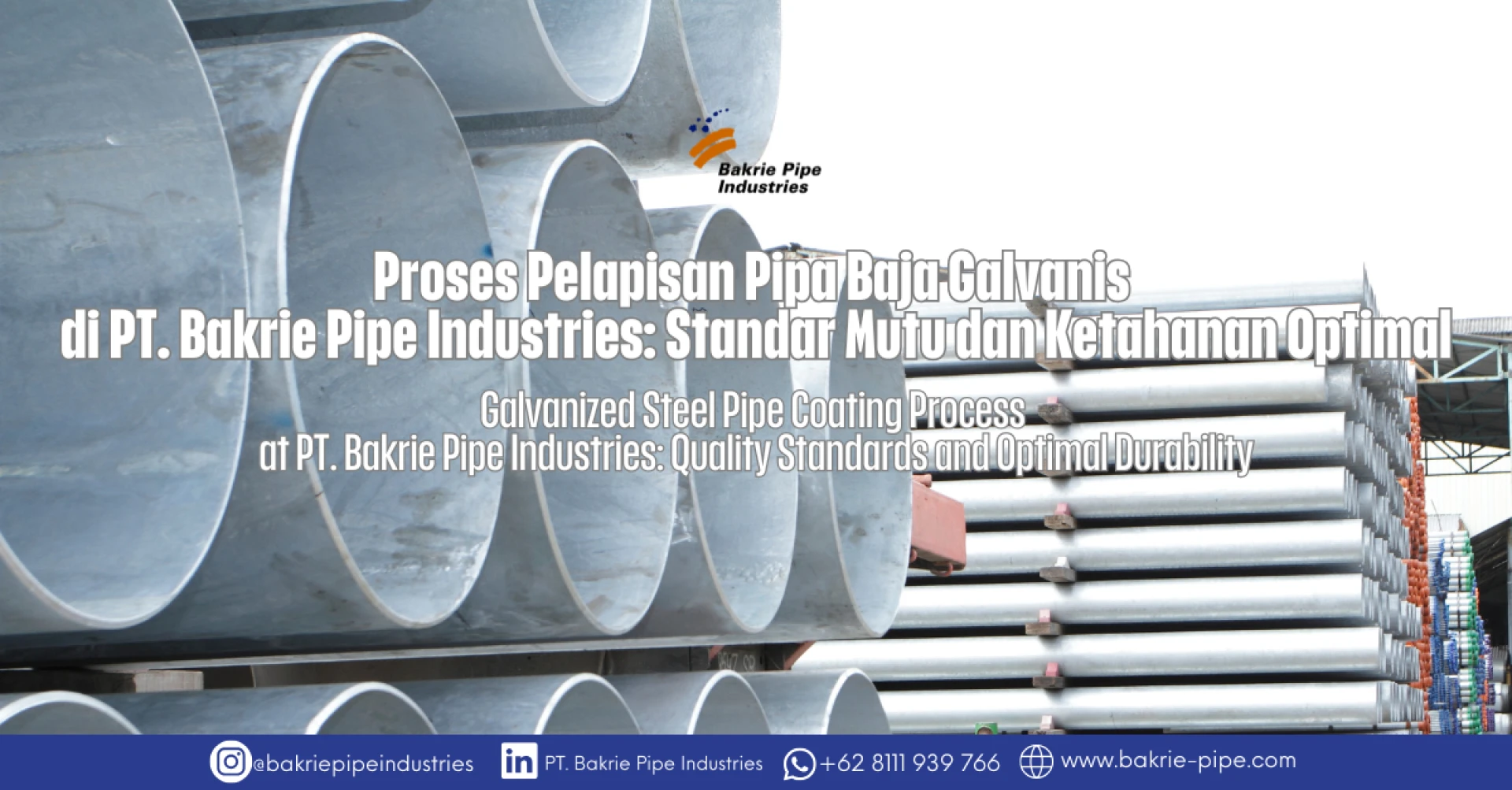Hello Pipe Enthusiasts!
Bakrie Pipe Industries’ galvanizing plant currently has a capacity of 20,000 tons per year, handling pipe sizes from ½ inch up to 36 inches with coating thicknesses between 45–120 μm (microns) and a standard pipe length of 6 meters. Below we discuss each process step by step.
1. Surface Preparation
Before entering the galvanizing stage, each steel pipe undergoes a thorough cleaning process. This stage includes:
- Washing with a specialized detergent to remove oil and surface contaminants
- Rinsing with clean water until no detergent residue remains
- Drying with compressed air to ensure a perfectly dry surface
This process is crucial to guarantee that the zinc layer adheres evenly and strongly without defects that could lead to early corrosion.
2. Pickling and Neutralization
After cleaning, the steel pipes are processed in a controlled-temperature bath of hydrochloric or sulfuric acid. The benefits of this stage include:
- Removing rust, iron oxides, and scale from prior heating processes
- Opening metal pores so that the zinc coating can penetrate properly
- Followed by rinsing with water and dipping in a mild alkali solution bath to neutralize any remaining acid
The pickling and neutralization sequence ensures the steel surface is fully prepared to receive a uniform zinc coating.
3. Fluxing (Flux Coating)
Pipes that have been freed of oxides are then dipped into a flux solution (typically zinc ammonium chloride). The main objectives of fluxing are:
- Inhibiting oxide formation during transfer to the galvanizing kettle
- Activating the steel surface for a perfect zinc–steel reaction
- Ensuring the reaction between zinc and pipe steel proceeds optimally
After fluxing is complete, the pipes are dried before entering the galvanizing stage. Flux also helps prevent air bubbles during coating, resulting in a smoother and more uniform final layer.
4. Galvanizing: Dip into Molten Zinc Bath
This is the core of the galvanizing process:
- Heat the zinc bath to approximately 450 °C until the zinc melts
- Immerse the pipes in molten zinc for 3–6 minutes, depending on diameter and wall thickness
- Zinc bonds chemically with the steel surface to form a dense zinc–iron intermetallic layer
This intermetallic layer serves as both a physical and chemical barrier against corrosion agents.
5. Cooling and Drying
After dipping, the pipes are moved to the cooling line:
- Initial cooling in open air until the pipe temperature drops to about 200 °C
- Controlled cold-water spray to complete the solidification process
- Final drying before entering the inspection area
Gradual, staged cooling prevents cracks in the galvanized coating that can occur if it cools too rapidly.
6. Quality Inspection and Coating Thickness Testing Bakrie Pipe Industries applies strict, batch-by-batch standards:
- Measure zinc layer thickness using a thickness gauge, sigmat, and roll meter
- Perform salt spray tests to assess corrosion resistance
- Conduct visual inspections to detect defects such as cracks, blisters, or thinning
All test results are documented and analyzed to ensure products meet customer specifications.
7. Finishing and Packing
The final step includes:
- Cutting pipe ends to ordered lengths, including threading if required
- Applying batch markings, certification labels, and bundling for packing
Shipping complete packages to our warehouse or directly to customers with full documentation
With this comprehensive process, from surface preparation through rigorous testing, PT. Bakrie Pipe Industries ensures its galvanized steel pipes deliver optimal durability under all field conditions. This thorough approach supports the reliability of customer infrastructure, from building construction to industrial piping installations.
If you require galvanized steel pipes for your project, consult with us; our team of expert engineers is ready to assist.
